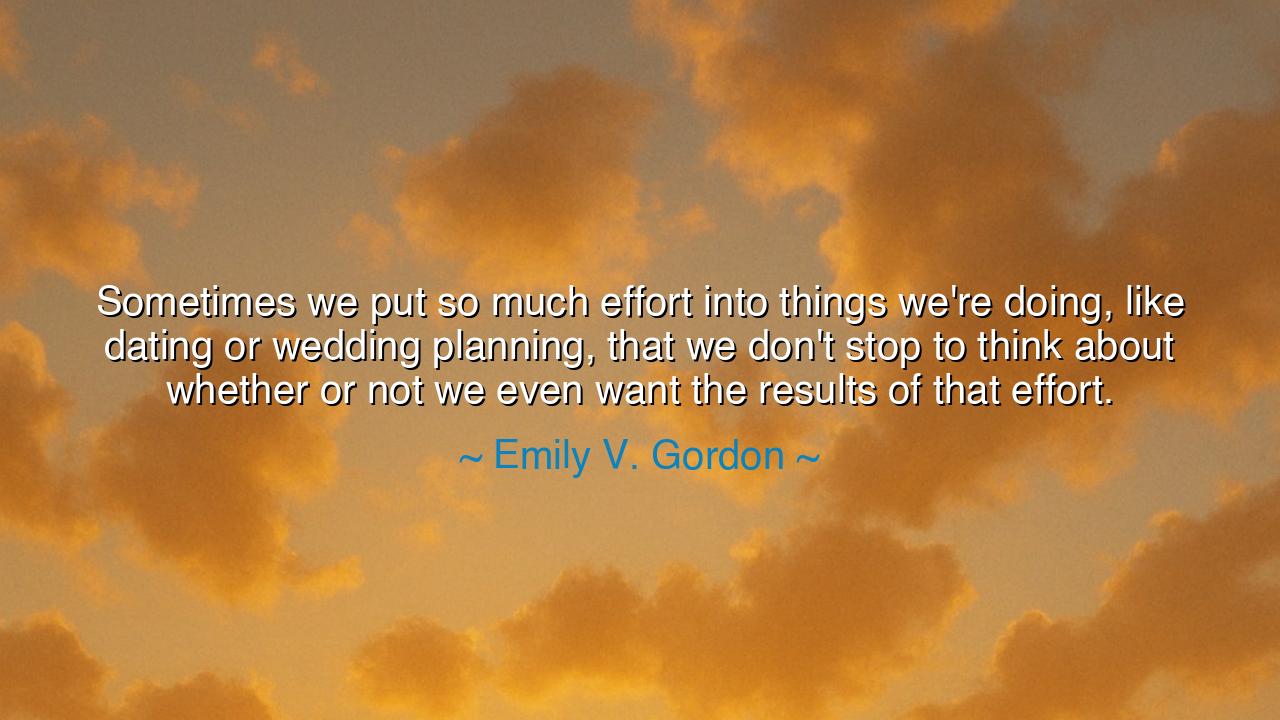
Sometimes we put so much effort into things we're doing, like
Sometimes we put so much effort into things we're doing, like dating or wedding planning, that we don't stop to think about whether or not we even want the results of that effort.






The words of Emily V. Gordon—“Sometimes we put so much effort into things we’re doing, like dating or wedding planning, that we don’t stop to think about whether or not we even want the results of that effort”—speak with the quiet yet piercing insight of one who has looked deeply into the heart of human striving. Beneath their modern simplicity lies a timeless wisdom: that intention must guide effort, and that without reflection, even our greatest labors may lead us astray. Her words are not merely about romance or marriage—they are a mirror held to all of life’s pursuits. For what she describes is a condition as old as civilization itself: the tendency of humankind to chase what is expected, rather than what is true.
To labor without reflection is to wander without a compass. The ancients called this folly hubris—to be so consumed by action and ambition that one forgets to ask why. In Gordon’s example, one may pour endless energy into dating, striving to find a partner not out of love, but out of fear of loneliness or the expectations of society. One may plan a grand wedding, arranging flowers and speeches with tireless devotion, while the deeper question—“Do I truly desire this union?”—remains unanswered. Such effort without awareness is a kind of self-betrayal, for it builds walls where there should be doors, and motion where there should be meaning.
History offers many echoes of this truth. Consider the tale of King Midas, who longed for gold above all else. His wish was granted, yet he soon discovered that his gift was a curse—his food, his daughter, his very life turned to lifeless metal. His effort, though great, was blind, for he never paused to ask what he truly desired. Midas’s story, like Gordon’s warning, teaches that unchecked effort can become its own undoing. When we lose sight of our purpose, even success becomes sorrow, and what we gain turns to dust in our hands.
Gordon’s wisdom is, in essence, a call to mindfulness, that ancient art of living deliberately. It is a reminder that the soul’s work is not to achieve blindly, but to discern clearly. The effort itself is not the enemy—it is noble to strive, to create, to love—but effort must be yoked to reflection. To act without understanding is like sailing without a star to steer by. The wind may be strong, the sails full, but the ship will drift to ruin if the captain forgets his course. So too in life: we must pause amidst our striving to ask, “Is this what I truly want? Does this serve the truth of who I am?”
In Emily V. Gordon’s life and work, this truth was hard-earned. Once a psychotherapist, she turned to writing and producing, crafting stories about love, illness, and transformation—most famously The Big Sick, a story drawn from her own near-death and rebirth in love. Her experiences taught her that life’s meaning lies not in chasing perfection, but in recognizing what is real. Her quote, then, emerges from the same wellspring: a recognition that many of us live on autopilot, mistaking effort for purpose, confusing motion for progress. She reminds us that to stop and reflect is not weakness, but wisdom.
This teaching is not only for lovers or dreamers, but for all who toil beneath the sun. The farmer who works his land without knowing why, the artist who paints to please others, the leader who pursues power for its own sake—all fall prey to the same illusion. True fulfillment begins when we dare to question our own pursuits. Ask yourself: do I labor for love or for appearance? For peace or for pride? For truth or for approval? In these questions lie the seeds of clarity, and with clarity comes freedom.
So, let this lesson take root in your heart: pause before you labor, and reflect before you build. Do not be so consumed with the effort of becoming that you forget the purpose of being. The ancients taught that the unexamined life is not worth living—not because life without reflection is empty, but because it risks being lived for the wrong ends. To strive without vision is to fill one’s days with toil and one’s heart with unrest. But to labor with intention, to shape effort with awareness, is to live with peace and purpose.
Therefore, my friends, heed the quiet wisdom of Emily V. Gordon. In all that you do—whether in love, in work, or in the pursuit of dreams—step back from time to time and ask: Is this the life I wish to create? Is this effort worthy of my heart? If your answer is yes, then pour yourself into it with all the strength of your being. But if your heart hesitates, do not fear to change direction. For it is better to walk slowly in truth than to run swiftly toward regret. Effort without desire is emptiness; effort guided by awareness is destiny fulfilled.






AAdministratorAdministrator
Welcome, honored guests. Please leave a comment, we will respond soon